Unit4 Teaching vocabulary,grammar and pronunciation王国祥
- 格式:ppt
- 大小:4.93 MB
- 文档页数:125
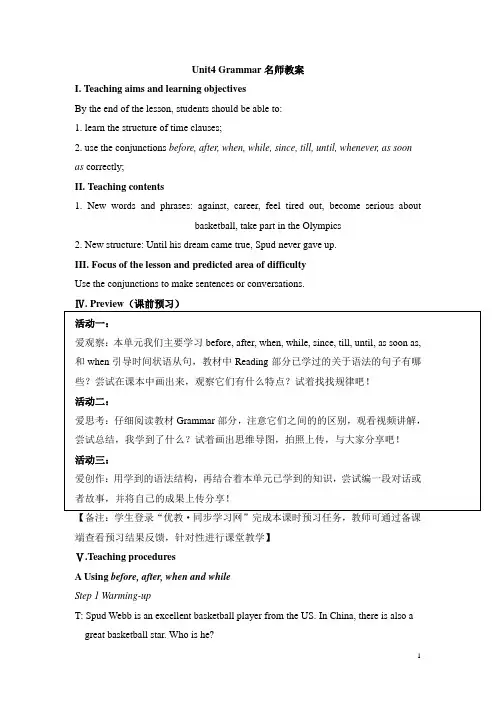
Unit4 Grammar名师教案I. Teaching aims and learning objectivesBy the end of the lesson, students should be able to:1. learn the structure of time clauses;2. use the conjunctions before, after, when, while, since, till, until, whenever, as soon as correctly;II. Teaching contents1. New words and phrases: against, career, feel tired out, become serious aboutbasketball, take part in the Olympics2. New structure: Until his dream came true, Spud never gave up.III. Focus of the lesson and predicted area of difficultyUse the conjunctions to make sentences or conversations.Ⅳ. Preview(课前预习)活动一:爱观察:本单元我们主要学习before, after, when, while, since, till, until, as soon as,和when引导时间状语从句,教材中Reading部分已学过的关于语法的句子有哪些?尝试在课本中画出来,观察它们有什么特点?试着找找规律吧!活动二:爱思考:仔细阅读教材Grammar部分,注意它们之间的的区别,观看视频讲解,尝试总结,我学到了什么?试着画出思维导图,拍照上传,与大家分享吧!活动三:爱创作:用学到的语法结构,再结合着本单元已学到的知识,尝试编一段对话或者故事,并将自己的成果上传分享!【备注:学生登录“优教·同步学习网”完成本课时预习任务,教师可通过备课端查看预习结果反馈,针对性进行课堂教学】Ⅴ.Teaching proceduresA Using before, after, when and whileStep 1 Warming-upT: Spud Webb is an excellent basketball player from the US. In China, there is also a great basketball star. Who is he?S: …T: Yes. David’s favourite basketball player! How much do you know about him?S: …Step 2 Presentation1. before, afterT: His parents are both basketball players. One is 2.08 m tall and the other is 1.88 m tall.Before Yao Ming was born, many people believed that he would be a basketball star.Did he become a basketball star later?S: …T: After he took some basketball training, he showed his talent in the game.2. When, whileT: When did he begin to take training?S: When he was 9, he began to take basketball training.T: Yes, he started training at 9.While/When he was attending junior high, he joined the Shanghai Youth Team. 【设计意图:以讨论David最喜欢的篮球明星姚明为线,导入新知识的学习。
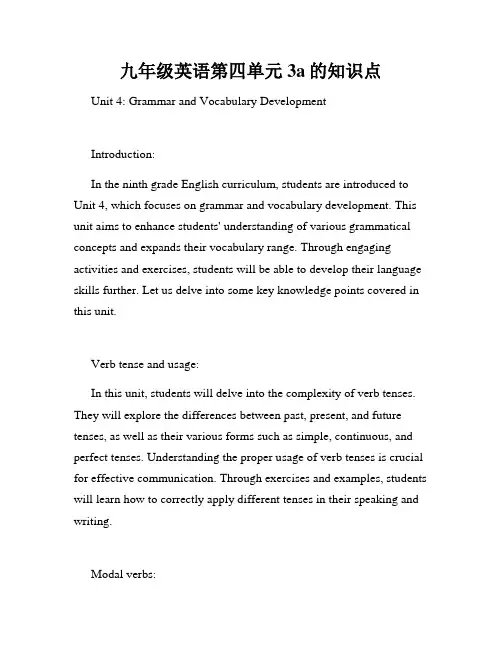
九年级英语第四单元3a的知识点Unit 4: Grammar and Vocabulary DevelopmentIntroduction:In the ninth grade English curriculum, students are introduced to Unit 4, which focuses on grammar and vocabulary development. This unit aims to enhance students' understanding of various grammatical concepts and expands their vocabulary range. Through engaging activities and exercises, students will be able to develop their language skills further. Let us delve into some key knowledge points covered in this unit.Verb tense and usage:In this unit, students will delve into the complexity of verb tenses. They will explore the differences between past, present, and future tenses, as well as their various forms such as simple, continuous, and perfect tenses. Understanding the proper usage of verb tenses is crucial for effective communication. Through exercises and examples, students will learn how to correctly apply different tenses in their speaking and writing.Modal verbs:Modal verbs are another important aspect of the English language covered in this unit. Students will familiarize themselves with modal verbs such as can, could, may, might, shall, should, will, would, must, and ought to, and understand their different meanings and uses. Modal verbs add nuances to expressions and allow students to convey levels of possibility, ability, obligation, and permission. Practical exercises will help students gain confidence in using these verbs appropriately.Adjectives and adverbs:Expanding vocabulary is an integral part of language development. In Unit 4, students will encounter a variety of descriptive words and adverbs that enhance their ability to express themselves effectively. They will learn about comparative and superlative forms, enabling them to compare and contrast people, objects, or situations in both written and spoken forms. By engaging in descriptive activities, students will enhance their vocabulary range and ability to provide vivid descriptions.Word formation:Word formation plays a significant role in expanding vocabulary. In this unit, students will explore the different ways words are formed, such as affixation (adding prefixes and suffixes), compounding, and conversion. Familiarity with word formation rules aids students indeciphering the meaning of unfamiliar words and allows them to construct new words themselves. Through interactive exercises, students will practice word formation techniques, boosting their language skills.Collocations:Collocations refer to words that tend to occur together frequently. In Unit 4, students will learn about common collocations and the importance of using them to express ideas accurately. Recognizing and incorporating appropriate collocations into their writing and conversation strengthens students' overall language proficiency, making their expressions more natural and nuanced.Conclusion:Unit 4 of the ninth-grade English curriculum introduces students to essential grammar and vocabulary development. The knowledge acquired in this unit equips students with a solid foundation for effective communication in English. From verb tense usage to modal verbs, adjectives, adverbs, word formation, and collocations, students gain a deeper understanding of the intricacies of the English language. By actively engaging in various activities and exercises, students can apply their newfound knowledge and refine their language skills further.。
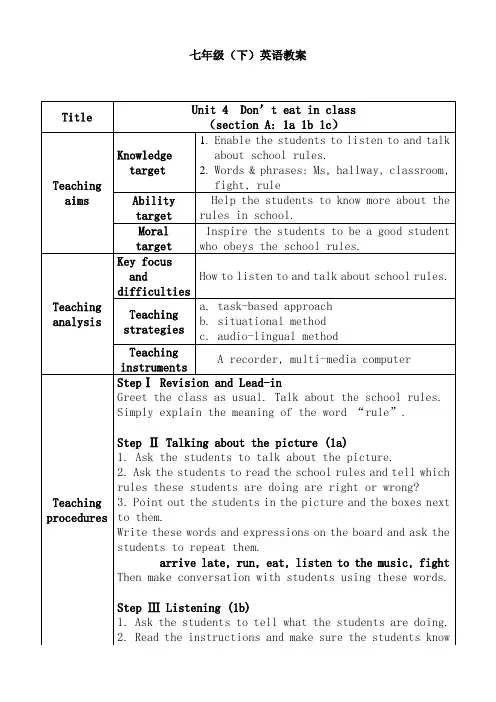
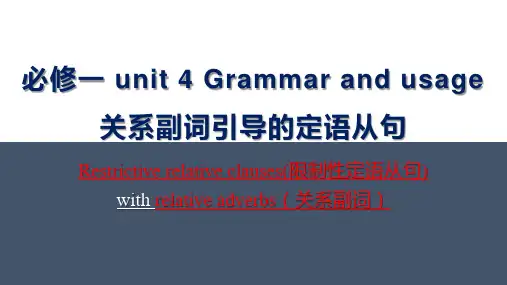
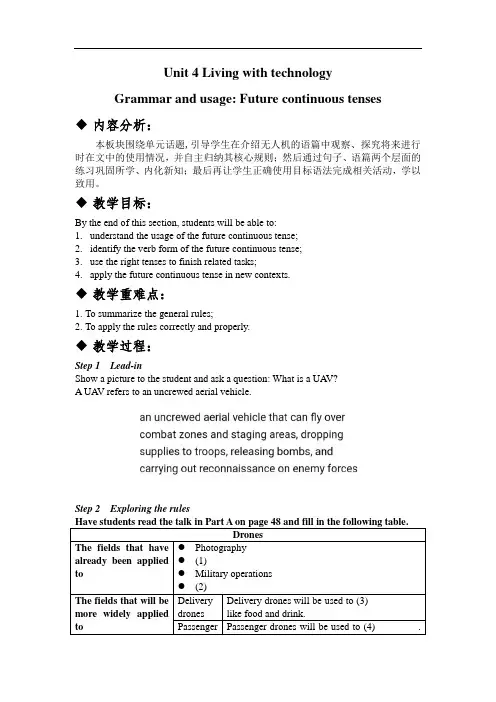
Unit 4 Living with technologyGrammar and usage: Future continuous tenses◆内容分析:本板块围绕单元话题,引导学生在介绍无人机的语篇中观察、探究将来进行时在文中的使用情况,并自主归纳其核心规则;然后通过句子、语篇两个层面的练习巩固所学、内化新知;最后再让学生正确使用目标语法完成相关活动,学以致用。
◆教学目标:By the end of this section, students will be able to:1.understand the usage of the future continuous tense;2.identify the verb form of the future continuous tense;e the right tenses to finish related tasks;4.apply the future continuous tense in new contexts.◆教学重难点:1.To summarize the general rules;2.To apply the rules correctly and properly.◆教学过程:Step 1 Lead-inShow a picture to the student and ask a question: What is a UA V?A UA V refers to an uncrewed aerial vehicle.Step 2 Exploring the rulesPossible Answer:(1)Scientific research(2)Disaster relief(3)deliver daily supplies(4)carry people in crowded cities(5)save time and greatly decrease road traffic(6)enter the age of personal flying vehicles(7)have a huge impact on everyday lifeUseful expressionmilitary operations 军事行动come into wider use 进入更广泛地使用as the name suggests 正如它的名字所显示的那样disaster relief 赈灾(行动)distribution of medicines 药物的派送(投递)It can be predicted that... 可以预测的是…before long 不久on a daily basis 每天there can be no denying that ... 不容否认的是…have a huge impact on 对…有巨大影响Have students fill in the box in part A on page 48AnswerToday I’ll be speaking to you about drones, ...... before long many people will be using drones to deliver daily supplies like food and drink...., we will be entering the age of personal flying vehicles...., we’ll all be interacting with drones on a daily basis.Step 3 Working out the rulesAnswers of working out the rules:(1) predictions(2) will be doingGo through the notes on page 99.Step 4 Applying the rulesHave students finish B1 on page 49.1.Celine: Lisa is a smart engineer. I feel proud to see the contributions she (a) ____________ (has made/ will be making) to the company.Jack: So do I. I also believe we (b) ___________ (are seeing/will be seeing) moreof them in the next few years.2.Sam: (a) _________(Will you be visiting/Have you visited) the science exhibition next month?Amy:Yes. You know I’m a technology enthusiast and I (b) __________ (am looking forward to/will be looking forward to) it.3.Alice:I (a) ____________ (have been giving/will be giving) a talk on artificial intelligence from 2 to 3 p.m. tomorrow. I really feel nervous.Simon:Take it easy. You (b) ____________(have been making/will be making) preparations and your audience will be impressed.Answers:1. has made will be seeing2. Will you be visiting am looking forward to3. will be giving have been makingHave students finish B2 on page 49 and then fill in the flowing table.For better or for worse, the widespread use of drones will affect our lives in different ways. It is certain that as the technology gets more advanced, more drones (1) ________ in the sky. Despite all the wonderful functions that drones perform, they may also cause trouble.Take air traffic for example. When passenger drones are flying above our cities in large quantities, the sky (2) ____________ more and more crowded. As a result, they are more likely to crash into each other. In addition, drones cause much trouble for airlines as some of them fly near airports, posing a threat to planes that (3) ____________ or landing.Another risk is that people might take advantage of drones to harm others. For instance, as more people (4) ____________ drones for photography in the future, some might spy on and take photographs of others without their knowledge. Illegal hunters might also use drones to track and kill animals.Such issues must be addressed. The government needs to make laws to monitor the production and use of drones. For example, in some countries, a remote pilot licence is required in order to fly a drone for business purposes. At the moment, different countries (5) ____________ air traffic control systems that can manage large numbers of drones. Police forces around the world are also looking at ways of stopping drones from flying near airports and stadiums.Answers:1. will be flying2. will be getting3. are taking off4. will be using5. are developingUseful Expressions in B2get more advanced 变得更先进in large quantities 大量的pose a threat to 对…构成威胁spy on 偷窥without one’s knowledge 在某人不知情的情况下address the issue 处理问题monitor the production 监测生产a remote pilot licence 遥控飞行员执照Have students finish B3 on page 49.Possible answerI predict that within 50 years, everyone will be riding in self-flying cars.I predict that in the future children will be studying at home using virtual reality headsets.Step 5 HomeworkFinish Exercise C on P76.【设计意图:强化知识运用。
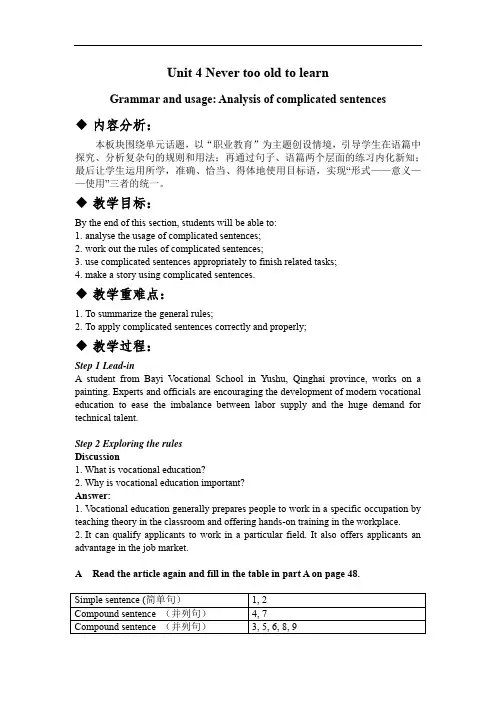
Unit 4 Never too old to learnGrammar and usage: Analysis of complicated sentences◆内容分析:本板块围绕单元话题,以“职业教育”为主题创设情境,引导学生在语篇中探究、分析复杂句的规则和用法;再通过句子、语篇两个层面的练习内化新知;最后让学生运用所学,准确、恰当、得体地使用目标语,实现“形式——意义——使用”三者的统一。
◆教学目标:By the end of this section, students will be able to:1.analyse the usage of complicated sentences;2.work out the rules of complicated sentences;e complicated sentences appropriately to finish related tasks;4.make a story using complicated sentences.◆教学重难点:1.To summarize the general rules;2.To apply complicated sentences correctly and properly;◆教学过程:Step 1 Lead-inA student from Bayi V ocational School in Yushu, Qinghai province, works on a painting. Experts and officials are encouraging the development of modern vocational education to ease the imbalance between labor supply and the huge demand for technical talent.Step 2 Exploring the rulesDiscussion1. What is vocational education?2. Why is vocational education important?Answer:1.V ocational education generally prepares people to work in a specific occupation by teaching theory in the classroom and offering hands-on training in the workplace.2.It can qualify applicants to work in a particular field. It also offers applicants an advantage in the job market.A Read the article again and fill in the table in part A on page 48.Tips复合句分为并列复合句compound sentence(也称并列句)和主从或从属复合句complex sentence(也称复杂句),并列复合句compound sentence是有并列连词:and、or、but连接;从属复合句complex sentence由一个主句(Principal Clause)和一个或一个以上的从句(Subordinate Clause)构成。
![人教新课标高中英语必修三Unit4_Astronomy全单元详细教案[1]1](https://uimg.taocdn.com/cca11907de80d4d8d15a4ff3.webp)
Unit 4 Astronomy: thescience of the starsContents 目录一、单元教学目标和要求(Teaching aims and demands)二、教材内容分析(Analysis of the teaching materials)三、单元预习任务(Pre-unit task)四、教学安排(Teaching arrangements)五、教学步骤(Teaching procedures)六、背景参考资料(Background knowledge)七、评价与反思(Assessment and reflection)一、教学目标和要求(Teaching aims and demands)根据《英语新课程标准》(实验稿)关于总目标的具体描述,结合高一学生实际和教材内容,我们将教学目标分为语言知识、语言技能、学习策略、情感态度、文化意识五个方面。
1.语言知识(Knowledge)词汇(Vocabulary):能理解、内化、运用以下生词--atmosphere, violent--violence, solid, explode, oxygen, surface, planet, harmful—harm, development—develop, spread, method, presence, telescope, disappointed, force, gradually, float, mass,短语(Phrases and expressions):the solar system, in time, carbon dioxide, prevent… from, depend on, cheer up, now that, break out,功能(Functions):学习掌握一些用于陈述问题及给予意见的结构,如:My problem/ trouble is……? The difficulty / question is…My advice/ suggestion is…What I think about it is…Please pay attention to…Make sure you …Watch out for…语法(Grammar):掌握和运用主语从句。
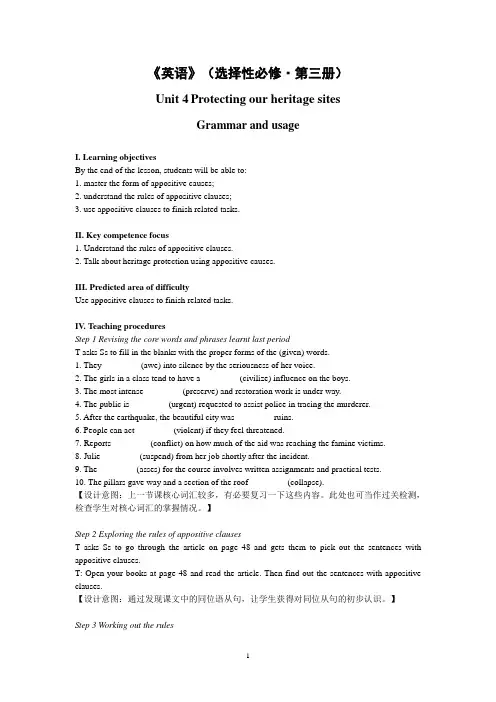
《英语》(选择性必修·第三册)Unit 4Protecting our heritage sitesGrammar and usageI. Learning objectivesBy the end of the lesson, students will be able to:1. master the form of appositive causes;2. understand the rules of appositive clauses;3. use appositive clauses to finish related tasks.II. Key competence focus1. Understand the rules of appositive clauses.2. Talk about heritage protection using appositive causes.III. Predicted area of difficultyUse appositive clauses to finish related tasks.IV. Teaching proceduresStep 1 Revising the core words and phrases learnt last periodT asks Ss to fill in the blanks with the proper forms of the (given) words.1. They ________ (awe) into silence by the seriousness of her voice.2. The girls in a class tend to have a ________ (civilize) influence on the boys.3. The most intense ________ (preserve) and restoration work is under way.4. The public is ________ (urgent) requested to assist police in tracing the murderer.5. After the earthquake, the beautiful city was ________ ruins.6. People can act ________ (violent) if they feel threatened.7. Reports ________ (conflict) on how much of the aid was reaching the famine victims.8. Julie ________ (suspend) from her job shortly after the incident.9. The ________ (asses) for the course involves written assignments and practical tests.10. The pillars gave way and a section of the roof ________ (collapse).【设计意图:上一节课核心词汇较多,有必要复习一下这些内容。
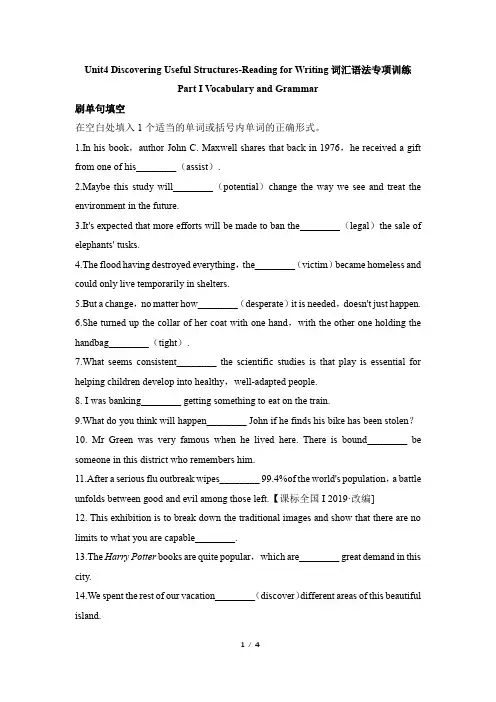
Unit4 Discovering Useful Structures-Reading for Writing词汇语法专项训练Part I Vocabulary and Grammar刷单句填空在空白处填入1个适当的单词或括号内单词的正确形式。
1.In his book,author John C. Maxwell shares that back in 1976,he received a gift from one of his________(assist).2.Maybe this study will________(potential)change the way we see and treat the environment in the future.3.It's expected that more efforts will be made to ban the________(legal)the sale of elephants' tusks.4.The flood having destroyed everything,the________(victim)became homeless and could only live temporarily in shelters.5.But a change,no matter how________(desperate)it is needed,doesn't just happen.6.She turned up the collar of her coat with one hand,with the other one holding the handbag________(tight).7.What seems consistent________ the scientific studies is that play is essential for helping children develop into healthy,well-adapted people.8. I was banking________ getting something to eat on the train.9.What do you think will happen________ John if he finds his bike has been stolen?10. Mr Green was very famous when he lived here. There is bound________ be someone in this district who remembers him.11.After a serious flu outbreak wipes________ 99.4%of the world's population,a battle unfolds between good and evil among those left.【课标全国I 2019·改编]12. This exhibition is to break down the traditional images and show that there are no limits to what you are capable________.13.The Harry Potter books are quite popular,which are________ great demand in this city.14.We spent the rest of our vacation________(discover)different areas of this beautiful island.15.Of the nineteen recognized polar bear subpopulations,three are declining,six________(be)stable,one is increasing,and nine lack enough data.【课标全国I 2019·改编]刷单句表达根据提示补全句子。
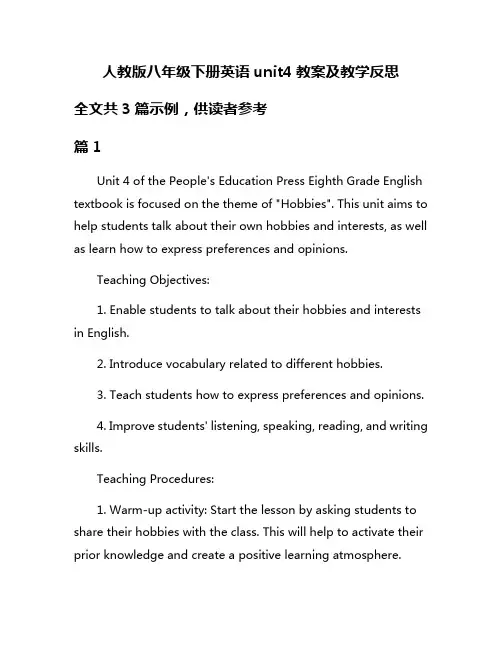
人教版八年级下册英语unit4教案及教学反思全文共3篇示例,供读者参考篇1Unit 4 of the People's Education Press Eighth Grade English textbook is focused on the theme of "Hobbies". This unit aims to help students talk about their own hobbies and interests, as well as learn how to express preferences and opinions.Teaching Objectives:1. Enable students to talk about their hobbies and interests in English.2. Introduce vocabulary related to different hobbies.3. Teach students how to express preferences and opinions.4. Improve students' listening, speaking, reading, and writing skills.Teaching Procedures:1. Warm-up activity: Start the lesson by asking students to share their hobbies with the class. This will help to activate their prior knowledge and create a positive learning atmosphere.2. Vocabulary introduction: Introduce key vocabulary related to hobbies, such as "painting", "cooking", "playing sports", etc. Use pictures, gestures, and realia to help students understand and remember the new words.3. Listening comprehension: Play a listening passage where people talk about their hobbies. Students listen and then answer comprehension questions to check their understanding.4. Speaking practice: Divide the class into pairs or groups and ask them to discuss their own hobbies, using the vocabulary they have learned. Encourage students to ask questions and share their opinions with each other.5. Reading activity: Give students a reading passage about different hobbies and ask them to identify key information, such as the benefits of each hobby and how to get started.6. Writing task: Ask students to write a short paragraph about their favorite hobby, describing why they enjoy it and how it makes them feel. Provide feedback on their writing to help improve their language skills.7. Role-play activity: Divide students into pairs and give them a role-play scenario where they discuss their preferencesfor different hobbies. This will help them practice expressing opinions and using the target vocabulary.8. Review and assessment: End the lesson with a review of key vocabulary and concepts covered in the unit. Administer a quiz or speaking activity to assess students' understanding and progress.Teaching Reflection:Overall, teaching Unit 4 on Hobbies was engaging and effective. The activities helped students practice speaking, listening, reading, and writing skills in a fun and interactive way. However, one area for improvement is to provide more opportunities for students to use the target language in real-life contexts. For example, incorporating project-based learning tasks where students create a hobby-themed presentation or video could further enhance their language proficiency.In conclusion, Unit 4 provided a valuable opportunity for students to explore their interests and hobbies in English. By incorporating a variety of activities and assessments, teachers can help students achieve the learning objectives and improve their English language skills.篇2Unit 4 of the People's Education Edition eighth grade English textbook covers the topic of "Wild Animals". In this unit, students will learn vocabulary related to wild animals, practice reading and listening skills through various texts, and improve their ability to describe animals and discuss their habitats.Lesson 1:- Warm-up: Start the lesson by asking students to name different wild animals they know.- Vocabulary: Introduce new vocabulary words related to wild animals such as lion, elephant, tiger, etc.- Reading: Read a short passage about different wild animals and ask students comprehension questions.- Listening: Play a recording of different animal sounds and ask students to match the sound with the correct animal.- Speaking: Have students describe their favorite wild animal and why they like it.Lesson 2:- Warm-up: Review the vocabulary words from the previous lesson by playing a matching game.- Reading: Read a longer passage about a safari trip and ask students to identify the animals mentioned in the text.- Grammar: Introduce comparatives and superlatives using examples related to wild animals (e.g. The elephant is bigger than the giraffe).- Speaking: Have students work in pairs to discuss which animal they think is the most interesting and why.Lesson 3:- Warm-up: Play a game of charades where students act out different wild animals for their classmates to guess.- Reading: Read a passage about endangered animals and discuss why it is important to protect them.- Writing: Have students write a short paragraph about what they can do to help protect endangered animals.- Speaking: Conduct a class debate on whether or not zoos are good for wild animals.Lesson 4:- Warm-up: Review the vocabulary and grammar concepts learned in the previous lessons through a quiz.- Project: Have students work in groups to create a poster about a specific wild animal, including information about its habitat, diet, and interesting facts.- Presentation: Have each group present their poster to the class and answer questions from their classmates.Teaching Reflection:Overall, the unit was engaging and interactive for students. The variety of activities helped to keep students interested and motivated throughout the lessons. The vocabulary and grammar concepts were presented in a clear and concise manner, allowing students to grasp the new material easily. The project at the end of the unit provided students with an opportunity to apply what they had learned and showcase their creativity. However, I would like to incorporate more opportunities for students to practice speaking and listening skills in future lessons to further develop their language proficiency.篇3Unit 4 of the eighth-grade textbook by People's Education Press focuses on the theme of "Wild animals". In this unit, students will learn about various wild animals and their habitats, as well as the importance of wildlife conservation.The unit is divided into several sections, including reading, listening, speaking, and writing tasks. The reading passages describe different wild animals such as lions, elephants, and pandas, providing students with essential information about these creatures. The listening activities help students improve their listening skills by practicing comprehension and understanding spoken English. Speaking tasks encourage students to express their opinions and share information about wild animals with their peers. Writing tasks require students to write short paragraphs or essays about their favorite kind of wild animal or the importance of wildlife conservation.To begin the unit, teachers can introduce the topic of wild animals by showing pictures or videos of different types of wildlife. This can generate interest and curiosity among students, prompting them to learn more about these fascinating creatures. Teachers can also engage students in group discussions or debates about wildlife conservation and the impact of human activities on the environment.During the reading and listening activities, teachers should provide support and guidance to students as they work through the text and audio materials. Encouraging students to ask questions, make predictions, and summarize key points can helpthem better comprehend the information presented. Teachers can also incorporate vocabulary-building exercises, such as word matching or crossword puzzles, to reinforce new words and concepts.For the speaking and writing tasks, teachers can encourage students to use creative expression and critical thinking skills. Providing opportunities for role-playing, storytelling, and collaborative writing can enhance students' language abilities and boost their confidence in using English. Teachers can also assign group projects or presentations that require students to research and present information about specific wild animals or conservation efforts.In conclusion, Unit 4 of the eighth-grade textbook by People's Education Press offers a comprehensive and engaging exploration of wild animals and wildlife conservation. By incorporating a variety of teaching strategies and activities, teachers can facilitate students' learning and language development in a meaningful and enjoyable way. Through active participation and interaction, students can deepen their understanding of the natural world and cultivate a sense of responsibility towards protecting our environment and its inhabitants.。

《英语》(选修·第一册)Unit 4 Fun with scienceGrammar and usageI. Learning objectivesBy the end of the lesson, students will be able to:1. identify the use of other cases of the subjunctive mood;2. work out the rules of other cases of the subjunctive mood;3. use the subjunctive mood to finish the task of correcting mistake and completing an article;4. make a conversation about snowflakes using the subjunctive mood;5. use the vocabulary: alike,*melt, *miracle,*vapour, *accumulate, *humidity.II. Key competence focus1. Develop the techniques of flexible use of language.2. Improve the power of cognition and comprehension.3. Apply learning strategies to practice.III. Predicted area of difficulty1. Applying the tips of subjunctive mood: other cases.2. Guessing the words in new context.IV. Teaching proceduresT Greet the class.T: Class begins. Good morning/afternoon!Step 1 Revising the words and phrases learnt last periodFill in the blanks with proper forms of the given words.1) In the 19th century, the Santa Claus tradition seems to have been ________ (transplant) back toEurope.1) transplanted2) Patients will ________ (isolate) from other people for a month after treatment.2) be isolated3) As the great day approached, she grew more and more ________ (nerve).3) nervous4) The best way to treat such a ________ (bleed) event is to apply firm pressure.4) bleeding5) The buildings have been designed ________ (blend) in with their surroundings.5) to blend6) When an ________ (infect) mosquito bites a human, spores are injected into the blood.6) infected【设计意图:上一节课词汇较多,有必要复习一下这些内容。
Unit 4 School Life教学设计(一)第一、第二课时Listening and Speaking一、教材分析本课教学内容选自高等教育出版社出版的“十四五”职业教育国家规划教材(中等职业学校公共基础课程教材)《英语 1 基础模块》中第四单元的热身(Warming Up)和听说(Listening and Speaking)板块,要求学生能在交谈中理解学校生活的相关信息,并能就学校相关课程和活动及时间安排进行交流。
二、学情分析校园生活是学生较为熟悉的话题,对于本单元的听说内容,学生在学科的表达以及校园活动相关词汇方面已经有了一定的积累,大多能使用诸如interesting和boring等形容词来表达个人的感受,但是或还无法就校园活动计划和时间安排进行自如交谈,对职业学校学习和生活方面的相关词汇了解也相对有限。
因此,教师在教学活动中引导学生结合自身的学习体会,由简到繁,由机械模仿到替换练习,再到语言实践,最终使学生能就学校相关课程和活动及时间安排进行流利交流。
三、教学目标1. 能理解描述学校学习和生活体会的相关对话并提取关键信息;2. 能理解校园学习生活安排的相关对话并获取关键信息;3. 能谈论职业学校的相关课程和活动及时间安排并就此表达自己的态度;4. 能结合本单元话题及自身体会,增进对我国职业教育的了解。
四、教学重点、难点分析教学重点:能谈论学校学习生活感受,讨论学校学习和生活活动及日程安排。
教学难点:能熟练运用谈论学习感受及学习生活安排相关的句型,如:What’s your favorite subject? / Why do you like it? / What are you going to do? / Where are they holding it? / When will it begin?五、教学过程Step 1 Warming Up1. Learn and match.处理教材活动1,可分两步:(1)和学生一起讨论以下两个问题What subject do you study?Which subjects do you like? Why?引导学生说出活动1中的词汇。
《英语》(选择性必修·第四册)Unit 4Never too old to learnGrammar and usageI. Learning objectivesBy the end of the lesson, students will be able to:1. analyse complicated sentences;2. understand the basic rules of simple, compound sentence, complex and compound-complexsentence;3. practice application of complicated sentences.II. Key competence focusAnalysis and practice of complicated sentencesIII. Predicted area of difficultyAnalysis of complicated sentences.IV. Teaching proceduresT greets the class.T: Class begins, boys and girls! Good morning/afternoon!Step 1 Revising the core words and phrases learnt last period.Fill in the blanks with proper forms of the (given) words.1. Our class ________ (compose) of 20 boys and 15 girls, most of whom are excellent at writing.1. is composed2. An ________ (educate) guess is a guess which is based on a certain amount of knowledge andis therefore likely to be correct.2. educated3. He’s too ________ (bind) up in his work to have much time for his children.3. bound4. We must find a way ________ (resolve) these problems before it’s too late.4. to resolve5. He walked on the opposite side of the street ________ (refresh) his memory of the building.5. to refresh6. Listening with an open mind to ________ (criticize) and accepting useful advice are the key toprogress and improvement.6. criticism7. You are a very ________ (inquire) mind person and your paper will achieve very good scores.7. inquiring8. If installed, the instrument ________ (register) every change of direction or height.8. will register9. I’ve personally never subscribed ________ the view that either sex is superior to the other.9. to10. In the world of fashion it sometimes seems that the only constant is ________ (cease) change.10. ceaseless【设计意图:上一节课核心词汇较多,有必要复习一下这些内容。